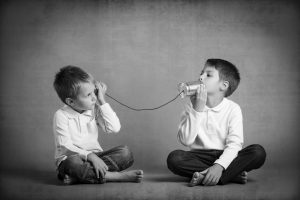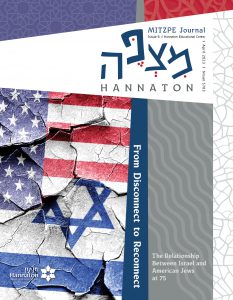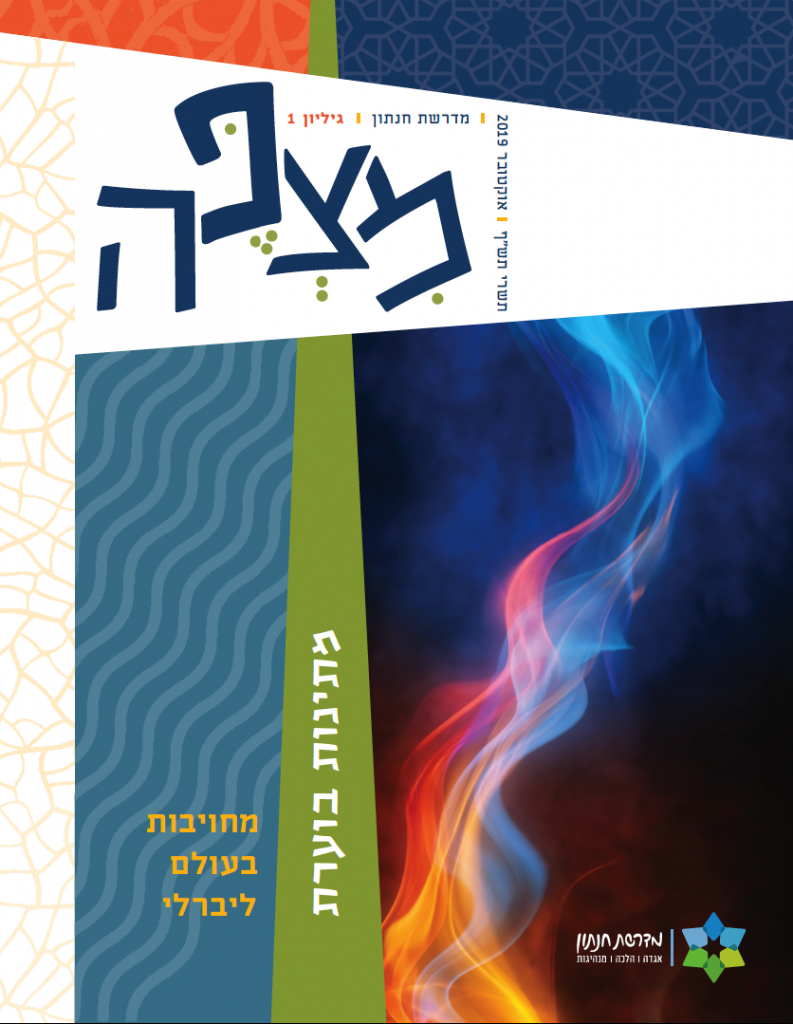In establishing Mechinat Hannaton (the Hannaton Educational Center), we placed at the core the in-depth study of Jewish, Zionist and humanist sources, deriving from the perception that the learning would shape our opinions and identity. Above all, we aspired that the learning would be – in the language of the Talmud – learning that leads to deeds because, otherwise, we will not be a part of the society in which we live.
Beside us we have often seen that education to deepen individual or group identity produces an isolated and elitist ethos, because the deeper the identity, the sharper the differences between me and the other. This produces a fear of those who are different, which results in erecting walls so as not to mix or change. From there, the road to forming stereotypes is short; at first it is simply ignorance, but it is easy to descend from there on a slippery slope to hatred. On the other hand, we believe that the role of strengthening and deepening one's identity is to open a door, build a bridge, and pave a path to the other and different from me. In our view, contact with someone different from me should give rise to dialogue, and dialogue can sometimes strengthen me and sometimes cause me to wonder about preconceived notions and opinions I held.
The Challenge of Identity
In my work as an educator, I deal with the identity challenge inherent in our society, Jewish and Jewish-Israeli. Who are we and how do we define ourselves? A society that has a hard time defining its story has a hard time finding its way, and in terms of education – even the lonely child who struggles to find roots and a home will be lost in our world. From the educational work and from my engagement with the contents of leadership and identity, I understand that my Jewish identity is directly linked to the way of life in the country, and that the attitude towards non-Jews is part of my Judaism and of who I am. My goal is not to build a wall that will set me apart from people different from me; the deeper I delve into my identity, the stronger the opposition/resistance inside of me. As part of this concept, and simply because we live in the Galilee, we sought answers through the establishment of the Educational Center – answers that are waiting to be found through its social involvement activities with the population of the nearby Arab villages.
In the Galilee, 57% of the population is Arab (with its diverse sects) and 43% is Jewish. Anyone who knows Hannaton knows that it is located between Kfar Manda and Bir al-Maksur and is enveloped by surrounding Arab villages and towns. Well, how do you get started? After all, only a year before the establishment of the Mechina I myself relocated from Jerusalem with my friends to re-establish Kibbutz Hannaton. I decided to simply drive to the villages, go to the mosques, knock on the door and start a conversation. The door was usually not opened to me, and if it was, I was told that they were cautious of me, suspecting me of being a member of the "price tag" movement [a group of violent Jewish anti-Arab fanatics] because I was wearing a kippah. Some of these trips did lead to a conversation with the Imam [local Muslim clergyman], but no discussion of options for doing volunteer work in the village took place.
I went to the community center of Kfar Manda, entered and introduced myself as a neighbor from Hannaton who wanted to offer volunteering at the community center. I was received by the person in charge of youth activities, and upon hearing explanations that I was setting up a pre-army program [mechina] through which we go out for social involvement and volunteering with our neighbours, he looked at me with a puzzled expression and asked, "You educate your students to serve in the army?! " He shook his head and looked at me as if I had fallen from the moon. I realized that nothing would come from this conversation, because the distance between us is so great. I could have gotten up, thanked him for the opportunity and left, but I stayed and asked him, 'Who do you want to work with in this community center – with Swedes? With Norwegians? The British? With whom exactly do you want to build a society and a country here?' It turned out that there really was no room for discourse, and my counterpart's unfriendly glance showed me the door.
I am a determined person, and yet I don't stay where I am not welcome. Just a second before I left, another person approached me and invited me into his office. It was the director of the community center, Adel Samahat, and this was the beginning of a friendship, and more than that – of working together and studying together in a complex reality. The Mechina students began volunteering two days a week at the community center. This is the story of one place of volunteering, but it has the potential to open a small window into the reality in which we live.
A shared visionof the future
Ben-Gurion declared, "In the Negev, the people of Israel and its state will be tested." The Negev has its own particular challenges, but the Galilee also has unique characteristics that create challenges, alongside opportunities and possibilities for building our society and our state. We want to live in the Galilee, love the Galilee and contribute to its resilience. Well – if Zionism is tested in the Negev, Israeli society will be tested in the Galilee. What is the nature of this statement?
- Both Jews and Arabs live in the Galilee; unlike in Jerusalem which is divided into East and West, we truly surround one
- In the Galilee a person wakes up in the morning to nature, and those who live in the city, too – in the Galilee it is enough to look up and see the mountains and the landscapes. We are immersed in the nature around us, and we have a responsibility towards it – "to work it and preserve it."
- In the Galilee, the wind that built our identity is blowing, and the Zionist leap from the Bible to the Palmach is channeled The creation of the Judaic oral law pulsates in the Galilee: the Mishnah signed in Tzipori, the "Jerusalemite" Talmud created in Tiberias, the writing of the Shulchan Aruch and the mysticism in Safed. A great spirit of creativity and deep thought.
All of these features create an opportunity for a shared life, value and ideal based, in the Galilee. Not just because it is verdant and beautiful here and it is expensive to live in the center of the country. The Galilee challenges us, and we are willing to make the effort. Above all, we want to touch our identity challenge, to address the big question – can we, Jews and Arabs, not merely live side by side? Can we create a common future vision, a future vision of country and society? This means that we will aspire to the same country and the same society. It's not easy but it is possible, by those who believe it can be so, those who understand that we have not come to erase the identity of the other – neither as an individual nor as a community, neither as a culture nor as a religion.
The inability to envision a common future for Jews and Arabs who are citizens of the state of Israel, or the inability to build a relationship based on a shared vision – is the challenge I seek to address. This barrier is not an academic problem, and the solution for it will not be found within the walls of the university; this is a problem of the people who truly live on the land and with it, of the older generation and the younger generation alike. As long as this problem is not resolved, not only will we not believe that we can live together in partnership, but again and again a crisis will arise that will deepen the distrust – just like what happened in May of 2021 during the [violent] "Guardian of the Walls" events. We are in the midst of a reality in which we have a glass ceiling above us that cannot be smashed and a glass floor below us that we are afraid to step on in the first place, because every step can lead to breakage and chaos. This is a reality in which the fear of the existing destruction paralyzes action, and therefore it is not at all possible to strive to move forward.
Creating the story, the vision, the common and agreed-upon framework is not a theoretical challenge; this is a real and practical challenge, and its solution lies in hard, thorough, systematic and in-depth field work. This is what the historian Shlomo Avineri writes in reference to the words of Ahad Ha'am: Morality is not a matter for funders and idlers who weave thoughts in ignorance […] The realm of morality is the practical, not the theoretical life, and the one who is undecided about the problems of morality by nature is the man of action …[1]
In this I believe with my whole being. There are no magic solutions but educational work that begins with creating trust and listening to the story of the other and continuing with thinking and creating a social and identity perception.
When I studied at the university for a degree in "Conflict Management and Resolution", the method taught was that we are entitled to hold different and even contradictory dreams, and this should be respected. However, when entering a room for dialogue one should put the disputes aside and get to know the person standing before you. Today I believe this is one of the reasons that encounters of this kind were not only not beneficial, but were even harmful, as they radicalized the discourse, and amplified mistrust between the parties. Man's dreams and aspirations are part of who he is, and his acceptance without all this "baggage" will be partial and even false. And so sometimes such encounters enlarged the rift – whether because of a lack of reliability or because the deep issues were felt below the surface and not talked about.
We are obligated to strive for a shared future vision. A society of "live and let live" is not a society, and a society of "what's mine is mine and what's yours is yours" will lead us to Sodom and Gomorrah, as the sage says (Mishnah, Avot 5: 10) Even if the shared image is not exactly the one we dreamed of, it will have the potential to go beyond what we can dream of today.
Hopelessness
During the "Guardians of the Walls" events, we experienced severe violence in the country – and especially in the Galilee. Those who did not believe in the ability of Jews and Arabs to live together in the state, on both sides, received reinforcement and confirmation of their perceptions, while those seeking to live together in the state and a common society suffered a severe blow, and actually experienced a real crisis. There is rage, there is violence. Returning to routine does not at all attest to the deep and real crisis of trust between the populations. One of the most famous sayings is that the basis of any relationship is trust, and in its absence the relationship can not exist over time – not between spouses, not between communities, and not between a minority and a majority. The outcome to mistrust is a sense of hopelessness that nothing will ever change here. The belief in my or my friends' ability to cope or rebel exists, but true hope and a belief in a different future seems to be absent. We are all partners in the difficult situation we have reached; we are all responsible for it.
If our belief is life-affirming, then we must not show any tolerance for violence and for horrific events as they were in "The Guardian of the Walls." The situation today is more dangerous than it was in the past, because in the past we would not have imagined lynching in the streets of Israel. This is just miniature state of anarchy, the Hobsian world order where man is always a wolf to another man; as if there is no law and order in society. This reality will undoubtedly repeat itself if nothing is done, if we think "we are back to normal".
Following the difficult events, I was invited to speak at several local conferences in our area. One of them took place in the Bedouin village of Manshiya Zabda on the 17th of Tammuz, a day that marks, according to tradition, the breaking of the Tablets of Stone. So, I opened with the story of Moses who broke the first tablets when the people transgressed in the sin of the golden calf, but again ascended Mount Sinai to receive the second tablets. The story reveals a reason for optimism, because it teaches that the covenant is stronger than the commandments, and that at its core the covenant was stronger than the sin. But this tradition also poses the question of whether today there is a strong enough alliance between us for a genuine trust through which we can build and be built upon[2]. Built only after a rupture, however, we must understand that if there is no building the rupture can turn into destruction.
When societies reach this point of desperation, they grow withdrawn and do not believe in a better tomorrow. They will inevitably slide down a demoralizing spiral, disheartening themselves into believing that they are the victim, that their current lives are the best they can hope for, and more. Hope, by an accepted psychological definition, is a person's ability to envision a future reality that is substantially better than the present, to believe that it can indeed exist, and to act to bring it into being. Without hope, no change can be made. Hope does not mean naivety but rather a belief in good, a belief in our ability to lead change, to believe in life.[3]
Jewish and democratic in the same breath
The State of Israel must strive to be a Jewish and democratic state "in the same breath", without caveats or equivocations; this is a not an easily comprehended concept: that Israel is both the nation-state of the Jewish people, and that within it minorities have equal rights in all but the national sense. The State of Israel thus prevents from tearing itself apart, for it is impossible to be a nation-state of two distinct peoples, each with their own sense of identity and definition. It should be noted, however, that the 'Law of Nationality' in its present form does not advance us. While attempting to affirm Jewish identity in Israel, it nonetheless harms all those members of Arab society who seek to be part of the State of Israel. This harm is embodied in the emphasis on the lack of official status for the Arabic language, as well as in the omission of the word "equality." I will strive to do everything I can so that those who want to be an equal part of our society and country will indeed feel that way, both in language and in acknowledgement of their pain, and more importantly – of their needs, so that they will live here and want to build together one united society.
Recently, this perspective was also expressed on the Arab side, in the words of Mansour Abbas, chairman of the RAAM party and a member of the current government: "Israel is a Jewish state, whether we like it or not, and my main goal is to define the status of the Arab citizens within it. I consider myself a citizen, in the fullest sense of the word, who is entitled to full civil rights."[4]
I recognize that Palestinian national identity is of significant importance to large parts of the Israeli Arab public. When there is an incident in al-Aqsa mosque or Gaza, it affects them and grieves them, as much as the suffering of a Jew in the world touches me. As an Israeli Jew, I must be sensitive and understand this deep connection, but that does not mean that I have to change the identity of my country because of it. However, of course in a democratic and Jewish state I will demand equal rights for the Arab citizens of Israel as human beings, as communities, as a culture, as a religion. And this requires proactivity from the state and not just reactivity, because culture, religion and communities require nurturing and empowerment.
Whoever leads us to a binational state leads us to the end of Zionism, whether they be a proponent of the conception of a "state of all its citizens" or a proponent of annexation – which in practice means the existence of a state in which two nations live but only one has the right to vote. These shared vision for the future were not built while listening to every voice. Anyone who thinks that a democratic aspect of Israel contradicts its Jewish aspect is probably not our partner on this journey. Whoever thinks that Israeli Arabs are not part of today's Jewish story, whoever thinks that Arabs do not exist at all in their personal picture of the future – it seems that they too will not join us. It is possible and just to live in a democracy with people who hold different and even contradictory dreams, but in order to build a future for a common society, one must work with people who want such a society, those who are not satisfied with maintaining a tolerable present but who’d rather hold a brighter and pragmatic image of a future toward which we can all aspire. The pragmatic and ideological majority must lead our future; otherwise the two poles will pull us down to our ruin. Ultimately, what is needed is an alliance of people with burning moderation.[5]
Jeremiah Inverted: From The North Disaster Will [Not] Be Poured
In the Galilee, we experience almost daily contact between Jews and Arabs – in the health and welfare systems, in commerce, in academia and more. We would expect such a reality to help each side know and accept the other, but in practice we see that stronger partnerships are not necessarily formed.
The first condition for progress is to create contact between us and the Arab population. The "Contact Hypothesis" theory of social engagement teaches us about the importance of direct contact between groups to reduce the intensity of conflicts and to alter prejudices.[6] According to studies, contact between groups in conflict is essential, because without contact and relations, trust can not be established, in order to correct misconceptions about others and discover each other's humanity. On the other hand, we see that in the mixed Arab-Jewish cities where the contact is closest, the situation is also the most dangerous. It turns out that negative contact overshadows the positive events.[7] We must fight racism from within and without; we must fight hatred and manifestations of negation of legitimacy; we must fight arrogance and contempt on both sides; we must take responsibility for negative and extreme phenomena in our discourse; and we must oppose those who seek to shatter the notion that we can live together and build a common society. We must take care of the wind that blows in Israeli society – not to be naive and simplistic on the one hand, but not to despair and arouse hatred and racism on the other. When we say that things need to change, it means that we too need to change – Jews and Arabs alike. The change may be painful; it may require us to give up and alter old dreams, but this concession is nothing compared to what we all have to lose. Change is important not only for us but also for our children, who are growing up in a less optimistic world and a less optimistic country than the ones we grew up in. The need is indeed pressing, and those who toil in hopes of change must not be lazy or frightened or lacking in faith.
At the Hannaton Mechina and Midrasha, we try to increase the contact that builds trust. So, we are in the Jewish and Arab villages and towns in the region twice a week, and we reach out to as many people as we can. We have quite a few partners around us, so we insist on talking and meeting with our neighbours, even when the situation is difficult.
Indeed, it is difficult to build and easy to destroy. We must look in the mirror and admit that what has been done so far is not enough and has no power to lead us to a different picture of the future. However, we have the power and the duty to work toward the exemplary society we hope for. For, it is well known that if you believe it can be broken, you believe it can be fixed.
In the difficult events that led to Operation "Guardian of the Walls", there was a lot of talk about governance. But it is important to remember that governance means not only order and law, but also education, kindness, charity and instilling hope for us all. The State of Israel is the fulfillment of the dream of generations of the Jewish People, but for a portion of the Arab citizens of Israel it currently means the continued denial of their dream. We must hold on to this complexity and live it.
Each generation has its mission. The first 50 years of the state contained enormous tasks, from the establishment of the state and society, through Israel's wars, up to the signing of peace accords. Since then, Israeli society seems to be facing smaller challenges, but its spirit is weaker. The mission of our generation is to take care not only of the continued existence of the State but also of its character, its soul, its identity, and the establishment of a worthy society in the Land of Israel – a country of just principles and righteous men, a society based on righteousness, truth and mercy.





